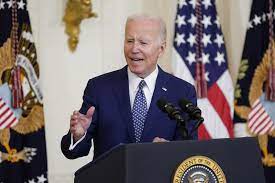Washington, Jun 15: President Joe Biden confirmed Tuesday that he will visit Saudi Arabia next month for talks with its leaders, a dramatic change in his stance on the kingdom that he pledged to make a “pariah” as a Democratic candidate for the White House.
With the visit at the tail end of a July 13-16 Middle East trip that includes stops in Israel and the West Bank, Biden is edging off his adversarial stance on the Saudis’ human rights record. He’s looking to reset the relationship at a time when the US could use help from the oil-rich kingdom to alleviate soaring prices at the pump for motorists at home and around the globe.
The stop in Saudi Arabia will include talks with Crown Prince Mohammed bin Salman, the de facto leader of the kingdom, according to White House and Saudi officials. US intelligence officials have determined Prince Mohammed likely ordered the 2018 killing of US-based journalist Jamal Khashoggi.
In a brief exchange with reporters Tuesday, Biden bristled when asked about his upcoming visit to Jeddah and noted that his team had laid out in a statement “everything I’m doing in the Middle East.”
Human rights advocates and some Democratic allies cautioned Biden about visiting the kingdom, saying such a visit without first getting human rights commitments would send a message to Saudi leaders that there are no consequences for egregious rights violations. The Saudis have been accused of using mass arrests, executions and violence to squelch dissent.
But at a time of skyrocketing prices at the gas pump, growing worries about Iran’s nuclear program and perpetual concern that China is expanding its global footprint, Biden and his national security team have determined that freezing out the Saudis, particularly the crown prince, is not in the U.S. Interest.
Sen. Dick Durbin, D-Ill, the No 2 Senate Democrat, told CNN that Biden “has a tough job dealing with gasoline prices.” But Durbin said he had “mixed feelings” about the visit, calling the Saudis’ human rights record “an outrage.”
The Senate’s No. 2 Republican leader accused Biden of paying too little attention to American energy.
John Thune of South Dakota said, “It just seems having to go hat in hand to the Saudis to try and get them to increase energy production because we won’t do it here, I think it’s unfortunate that an American president is put in that position.”
The Saudi Embassy in Washington described the visit as coming at the king’s invitation “to strengthen the historical bilateral relations and the distinguished strategic partnership between” the two countries.
The White House announced the trip after Saudi Arabia this month helped nudge OPEC+ to ramp up oil production by 648,000 barrels per day in July and August, and the kingdom agreed to extend a United Nations-mediated cease-fire in its seven-year war with Yemen. Biden called the Saudi cease-fire decision “courageous.” Prince Mohammed, who is commonly referred to by his initials, MBS, played a “critical role” in brokering an extension of the cease-fire, according to a senior administration official who briefed reporters on the condition of anonymity.
White House press secretary Karine Jean-Pierre said King Salman invited Biden to visit the kingdom during a gathering in the port city of Jeddah of the six Gulf Cooperation Council nations — Bahrain, Kuwait, Oman, Qatar, Saudi Arabia and the United Arab Emirates — as well as Egypt, Iraq and Jordan.
She suggested that Biden would raise human rights concerns with Saudi officials but did not directly answer whether the president would speak to Prince Mohammed about the Khashoggi killing.
“It’s important to also emphasize that while we recalibrate relationships, we are not looking to rupture relationships,” Jean-Pierre said.
Hala al-Dosari, a prominent rights advocate in Saudi Arabia now living and teaching in the United States, said Biden’s decision to meet with the crown prince is “a betrayal.” She also raised concerns that Biden’s visit to Israel glosses over last month’s fatal shooting of prominent American-Palestinian Al Jazeera journalist Shireen Abu-Akleh in the West Bank. Independent investigations by The Associated Press and some other news organizations concluded Israeli fire likely killed the veteran journalist. Israel has said it would investigate.
Al-Dosari accused the administration of “prioritizing immediate interests over long-term goals of supporting democratic transitions” in Arab countries and “the immediate interests of securing more oil, and support for Israel.”
Family members of 9/11 victims have also raised concerns about the Saudi Arabia visit. Fifteen of the 19 hijackers were Saudi citizens.
John Kirby, the National Security Council coordinator for strategic communications, in a CNN interview Tuesday said Biden understands the “devastating grief” 9/11 families endure and “will not shy away from representing them and their concerns.”
“We appreciate the President’s commitment to do everything he can to support the 9/11 family community, but empathy is not enough,” Terry Strada, national chair of the group 9/11 Families United, said in a statement.
Biden’s first stop during the Middle East swing will be in Israel for a long-planned visit with Israeli Prime Minister Naftali Bennett in Jerusalem. He will then meet with Palestinian Authority leaders, including Mahmoud Abbas, in the West Bank. Biden will cap the whirlwind trip with the visit to Jeddah. (AP)
Trending Now
E-Paper


